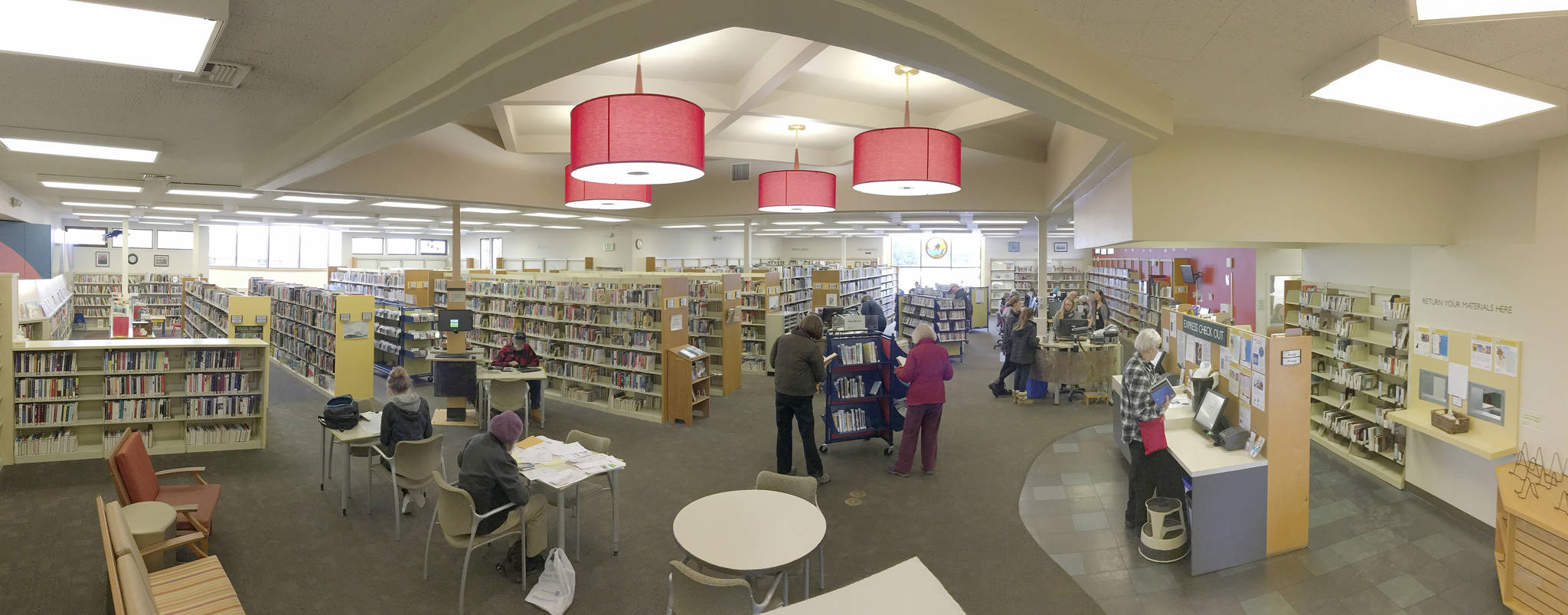To add on or to start anew.
Officials with the North Olympic Library System are closing in on a plan that would, assuming local support through a ballot measure, change the face of the well-used Sequim Library.
The library system’s Board of Trustees meets at 5:30 p.m. Thursday, Feb. 22, at the Sequim branch, 630 N. Sequim Ave., with a possible recommendation on a construction approach and corresponding conceptual design to expand the 6,000-square-foot facility.
The construction approach comes down to two options: a major remodel (Option 1), or rebuilding the facility (Option 2). Margaret Jakubcin, director of the North Olympic Library System, said a group studying the expansion plan expected costs between the remodel and new construction to be significantly different.
Cost estimates provided by NOLS indicate, however, new construction is about 10 percent more than remodeling the facility.
A 15,000-square-foot “reused” (remodeled) building would cost about $9.6 million while a newly-constructed building of that size would cost about $10.4 million. A 17,000-square foot “reused” facility would cost about $10.66 million, while new construction at 17,000 square feet would cost about $11.7 million.
Cost plan estimates for the two options reflect construction of buildings to accommodate 30-year population growth.
“(The board will) want to go one route or another; this was a decision that had to happen at this point,” Jakubcin said.
An ad hoc Sequim expansion committee assembled to consider information provided design firm SHKS Architects — a group library management personnel, two NOLS trustees who serve as the Board of Trustees’ liaisons to the Sequim Expansion Project, as well as four community at-large participants — is going to recommend new construction, Jakubcin wrote to the Board of Trustees on Feb. 15.
While board members will not be making a decision this week about if and when to approach voters for funding, a working Sequim expansion project timeline has the board making a funding approach decision by May 2018 in order to have the option of placing a ballot measure before voters in the November 2018 General Election.
The board of trustees will have another public meeting in Sequim prior to a decision about a ballot measure, Jakubcin said.
“We’ll have about another month or two for conceptual planning,” she said.
The library system funded a feasibility study in 2013 and 2014 to examine costs toward a major expansion of the Sequim facility. The push for expansion stepped up about a year-and-a-half ago when library officials and officials from the design firm SHKS Architects began making presentations with community groups — “to anyone who would have us come and talk to them,” Jakubcin said — in order to gauge design preferences and answer questions about expansion options.
“We’ve worked hard (to get) the community involved,” Jakubcin said.
“The community as a whole has waited a long time for this.”
Pros, cons
The Sequim expansion committee listed a number of pros and cons for both remodel and new construction options.
Option 1 (remodel) would be viewed by the community as a “pragmatic” approach to expansion. Costing less overall, the remodel approach would also retain a structure that some users may feel sentimental toward.
Option 1 had plenty of proverbial red flags for the committee, however. Renovation and repair costs are more difficult to predict and estimate, while deferred upgrades will nonetheless require future repairs and maintenance. Existing architecture would be less flexible to accommodate future use, and remodeling supports only westward development, limiting maximum library size.
Option 2, new construction, provides for a more coherent and consistent design, a new “visual identity,” and offers more predictable costs, committee members noted. The option also provides for better opportunities for parking, book drop-offs and proximity of meeting rooms to parking spots, more flexibility for changing future needs and offer more efficient staff work spaces.
Initial costs for Option 2 are greater, however. The new construction would necessitate a temporary relocation of library services, and could be seen as “extravagant,” the committee noted.
By the numbers
Sequim has had a public library in some form since 1936, according to library officials. Sequim joined what eventually became the North Olympic Library System in 1947.
The structure that now stands at 630 N. Sequim Ave. was built in 1983. As of 2016, it housed more than 51,000 of the library system’s 274,000-plus items.
Thanks to a $160,000-plus boost from the Friends of Sequim Library, the facility got a major face-lift in 2009 that addressed several maintenance issues (heating/cooling, electrical and septic systems, leaky skylights, etc.). The remodel did not add any square footage to the facility, however.
While the Sequim Library’s usage is smaller than the main NOLS facility in Port Angeles — as of March 2017, Sequim’s saw about 391 customer visits and 1,243 checkouts per day, compared to 602 visits and 1,351 checkouts per day in Port Angeles — the Sequim building is five times smaller.
“This (Sequim) facility is just too small even for current use — and going forward,” Jakubcin said last March.
While many services are becoming increasingly available online, Sequim’s and other NOLS branches remain a base to dozens of programs year-round. The library’s various community-oriented programs include adult book discussion groups, Art in the Library, poetry walks, the Summertime Music! outdoor concert series, youth coding camps, documentary film screenings, Battle of the Books and Humanities Washington, among others — plus several programs the library system is involved outside of its brick-and-mortar facilities.
Staff rooms are cramped, books fill every shelf and computer use is at capacity while meeting space is at a premium, library officials say, with just one private meeting room on site, staff said.
In 2016, Sequim Library’s meeting room was used 471 times. For comparison, Port Angeles’ was used 390 times.
For more information, visit www.nols.org, or contact Jakubcin at 360-417-8500, x7714 or via email to director@nols.org.



